Analysis of the Strongest Moral Argument for God's Existence
VerifiedAdded on 2021/01/01
|8
|2427
|204
Essay
AI Summary
This essay delves into the philosophical and theological arguments surrounding the existence of God, with a particular focus on the moral argument. It explores the relationship between philosophy and theology, highlighting the distinct starting points and methodologies of each discipline, including the Thomistic model. The essay examines the interplay between reason and revelation, as well as the relationship between faith and reason, and how these concepts are used to support the existence of God. It analyzes different philosophical viewpoints on the existence of God, including the role of morality and the challenges posed by atheism. The essay also examines the epistemology of religion, including different approaches to justifying religious beliefs, and how these approaches are applied in various religions like Hinduism and Christianity. The conclusion summarizes the key arguments and insights presented throughout the essay, offering a comprehensive overview of the moral argument for God's existence and its implications.
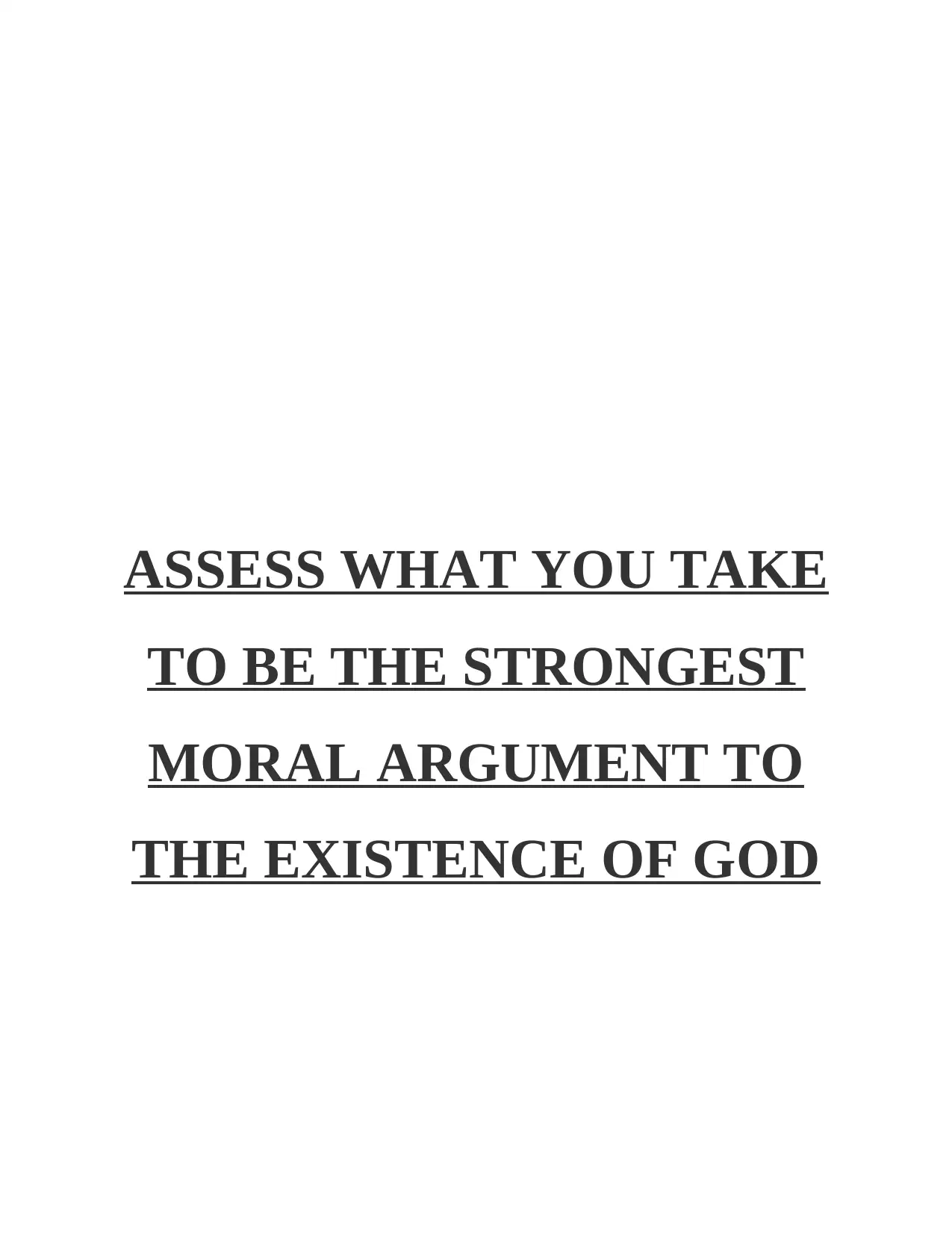
ASSESS WHAT YOU TAKE
TO BE THE STRONGEST
MORAL ARGUMENT TO
THE EXISTENCE OF GOD
TO BE THE STRONGEST
MORAL ARGUMENT TO
THE EXISTENCE OF GOD
Paraphrase This Document
Need a fresh take? Get an instant paraphrase of this document with our AI Paraphraser
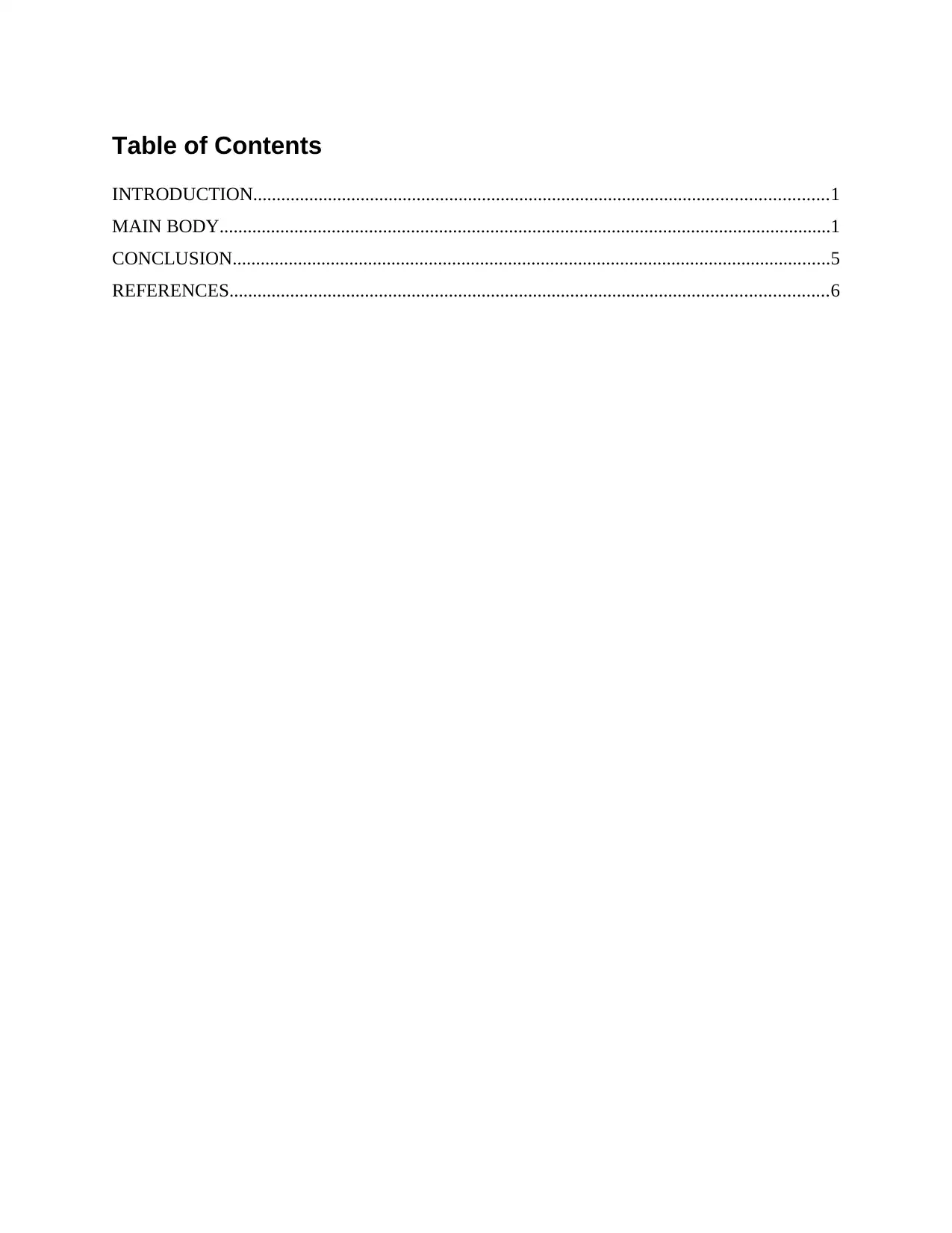
Table of Contents
INTRODUCTION...........................................................................................................................1
MAIN BODY...................................................................................................................................1
CONCLUSION................................................................................................................................5
REFERENCES................................................................................................................................6
INTRODUCTION...........................................................................................................................1
MAIN BODY...................................................................................................................................1
CONCLUSION................................................................................................................................5
REFERENCES................................................................................................................................6
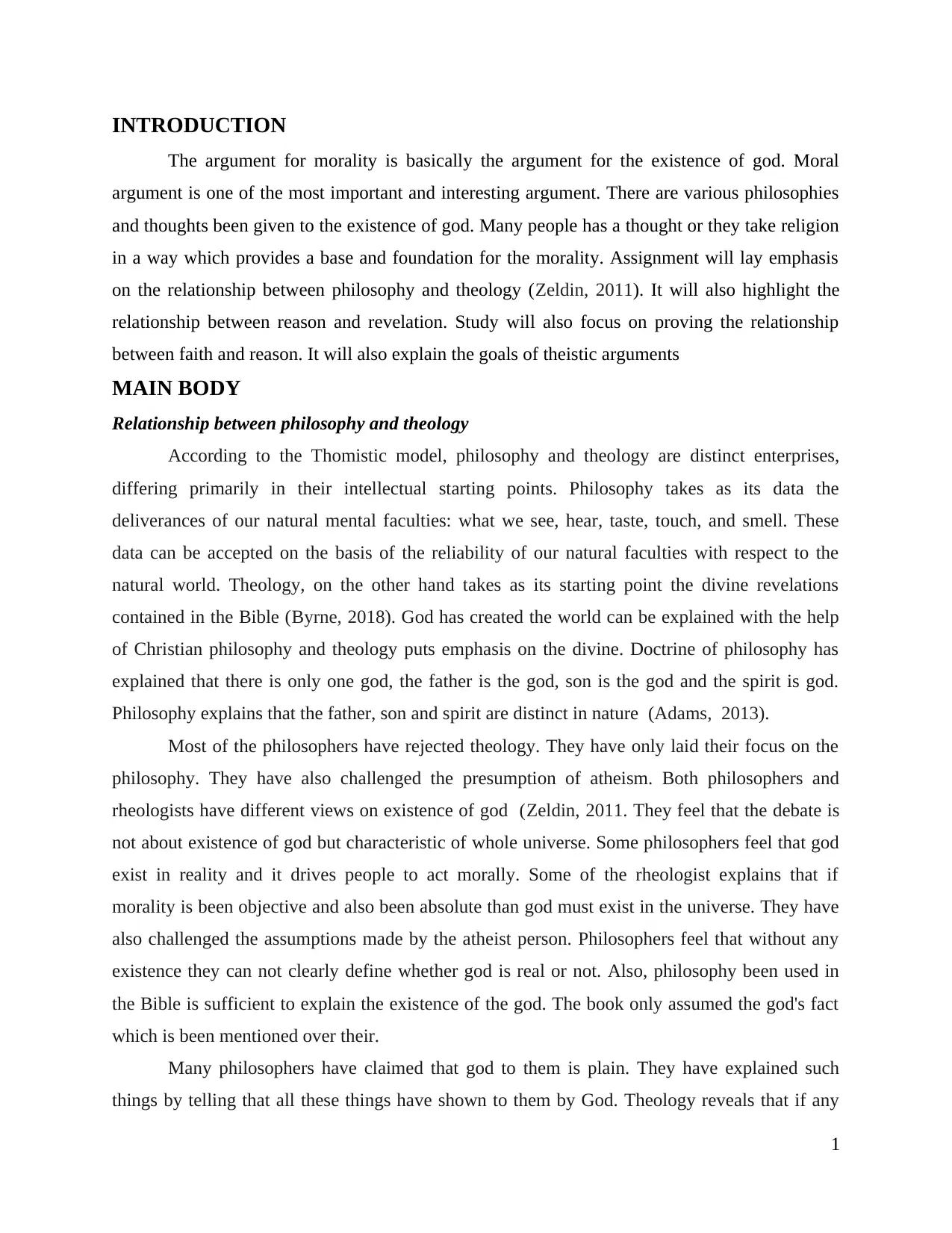
INTRODUCTION
The argument for morality is basically the argument for the existence of god. Moral
argument is one of the most important and interesting argument. There are various philosophies
and thoughts been given to the existence of god. Many people has a thought or they take religion
in a way which provides a base and foundation for the morality. Assignment will lay emphasis
on the relationship between philosophy and theology (Zeldin, 2011). It will also highlight the
relationship between reason and revelation. Study will also focus on proving the relationship
between faith and reason. It will also explain the goals of theistic arguments
MAIN BODY
Relationship between philosophy and theology
According to the Thomistic model, philosophy and theology are distinct enterprises,
differing primarily in their intellectual starting points. Philosophy takes as its data the
deliverances of our natural mental faculties: what we see, hear, taste, touch, and smell. These
data can be accepted on the basis of the reliability of our natural faculties with respect to the
natural world. Theology, on the other hand takes as its starting point the divine revelations
contained in the Bible (Byrne, 2018). God has created the world can be explained with the help
of Christian philosophy and theology puts emphasis on the divine. Doctrine of philosophy has
explained that there is only one god, the father is the god, son is the god and the spirit is god.
Philosophy explains that the father, son and spirit are distinct in nature (Adams, 2013).
Most of the philosophers have rejected theology. They have only laid their focus on the
philosophy. They have also challenged the presumption of atheism. Both philosophers and
rheologists have different views on existence of god (Zeldin, 2011. They feel that the debate is
not about existence of god but characteristic of whole universe. Some philosophers feel that god
exist in reality and it drives people to act morally. Some of the rheologist explains that if
morality is been objective and also been absolute than god must exist in the universe. They have
also challenged the assumptions made by the atheist person. Philosophers feel that without any
existence they can not clearly define whether god is real or not. Also, philosophy been used in
the Bible is sufficient to explain the existence of the god. The book only assumed the god's fact
which is been mentioned over their.
Many philosophers have claimed that god to them is plain. They have explained such
things by telling that all these things have shown to them by God. Theology reveals that if any
1
The argument for morality is basically the argument for the existence of god. Moral
argument is one of the most important and interesting argument. There are various philosophies
and thoughts been given to the existence of god. Many people has a thought or they take religion
in a way which provides a base and foundation for the morality. Assignment will lay emphasis
on the relationship between philosophy and theology (Zeldin, 2011). It will also highlight the
relationship between reason and revelation. Study will also focus on proving the relationship
between faith and reason. It will also explain the goals of theistic arguments
MAIN BODY
Relationship between philosophy and theology
According to the Thomistic model, philosophy and theology are distinct enterprises,
differing primarily in their intellectual starting points. Philosophy takes as its data the
deliverances of our natural mental faculties: what we see, hear, taste, touch, and smell. These
data can be accepted on the basis of the reliability of our natural faculties with respect to the
natural world. Theology, on the other hand takes as its starting point the divine revelations
contained in the Bible (Byrne, 2018). God has created the world can be explained with the help
of Christian philosophy and theology puts emphasis on the divine. Doctrine of philosophy has
explained that there is only one god, the father is the god, son is the god and the spirit is god.
Philosophy explains that the father, son and spirit are distinct in nature (Adams, 2013).
Most of the philosophers have rejected theology. They have only laid their focus on the
philosophy. They have also challenged the presumption of atheism. Both philosophers and
rheologists have different views on existence of god (Zeldin, 2011. They feel that the debate is
not about existence of god but characteristic of whole universe. Some philosophers feel that god
exist in reality and it drives people to act morally. Some of the rheologist explains that if
morality is been objective and also been absolute than god must exist in the universe. They have
also challenged the assumptions made by the atheist person. Philosophers feel that without any
existence they can not clearly define whether god is real or not. Also, philosophy been used in
the Bible is sufficient to explain the existence of the god. The book only assumed the god's fact
which is been mentioned over their.
Many philosophers have claimed that god to them is plain. They have explained such
things by telling that all these things have shown to them by God. Theology reveals that if any
1
⊘ This is a preview!⊘
Do you want full access?
Subscribe today to unlock all pages.

Trusted by 1+ million students worldwide
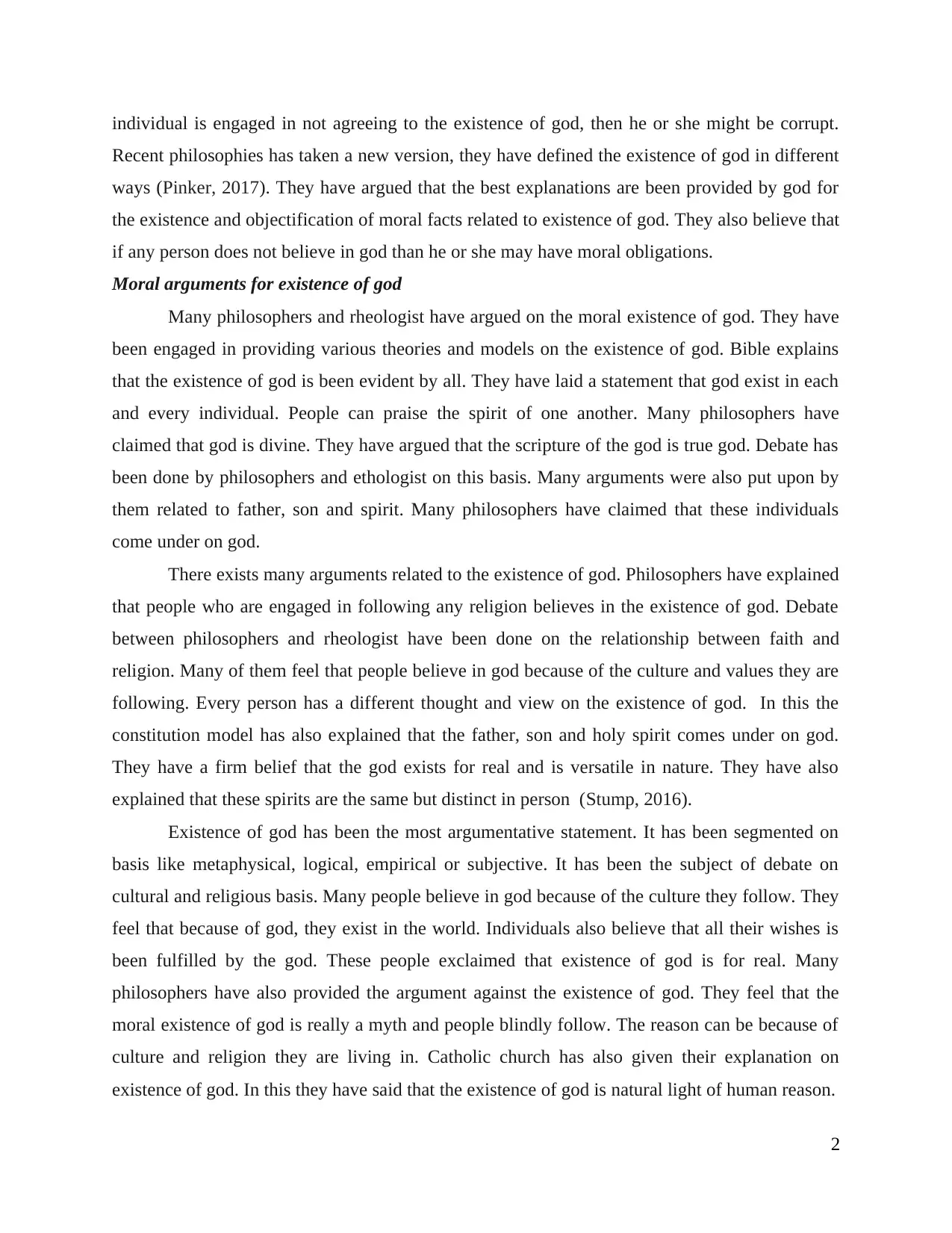
individual is engaged in not agreeing to the existence of god, then he or she might be corrupt.
Recent philosophies has taken a new version, they have defined the existence of god in different
ways (Pinker, 2017). They have argued that the best explanations are been provided by god for
the existence and objectification of moral facts related to existence of god. They also believe that
if any person does not believe in god than he or she may have moral obligations.
Moral arguments for existence of god
Many philosophers and rheologist have argued on the moral existence of god. They have
been engaged in providing various theories and models on the existence of god. Bible explains
that the existence of god is been evident by all. They have laid a statement that god exist in each
and every individual. People can praise the spirit of one another. Many philosophers have
claimed that god is divine. They have argued that the scripture of the god is true god. Debate has
been done by philosophers and ethologist on this basis. Many arguments were also put upon by
them related to father, son and spirit. Many philosophers have claimed that these individuals
come under on god.
There exists many arguments related to the existence of god. Philosophers have explained
that people who are engaged in following any religion believes in the existence of god. Debate
between philosophers and rheologist have been done on the relationship between faith and
religion. Many of them feel that people believe in god because of the culture and values they are
following. Every person has a different thought and view on the existence of god. In this the
constitution model has also explained that the father, son and holy spirit comes under on god.
They have a firm belief that the god exists for real and is versatile in nature. They have also
explained that these spirits are the same but distinct in person (Stump, 2016).
Existence of god has been the most argumentative statement. It has been segmented on
basis like metaphysical, logical, empirical or subjective. It has been the subject of debate on
cultural and religious basis. Many people believe in god because of the culture they follow. They
feel that because of god, they exist in the world. Individuals also believe that all their wishes is
been fulfilled by the god. These people exclaimed that existence of god is for real. Many
philosophers have also provided the argument against the existence of god. They feel that the
moral existence of god is really a myth and people blindly follow. The reason can be because of
culture and religion they are living in. Catholic church has also given their explanation on
existence of god. In this they have said that the existence of god is natural light of human reason.
2
Recent philosophies has taken a new version, they have defined the existence of god in different
ways (Pinker, 2017). They have argued that the best explanations are been provided by god for
the existence and objectification of moral facts related to existence of god. They also believe that
if any person does not believe in god than he or she may have moral obligations.
Moral arguments for existence of god
Many philosophers and rheologist have argued on the moral existence of god. They have
been engaged in providing various theories and models on the existence of god. Bible explains
that the existence of god is been evident by all. They have laid a statement that god exist in each
and every individual. People can praise the spirit of one another. Many philosophers have
claimed that god is divine. They have argued that the scripture of the god is true god. Debate has
been done by philosophers and ethologist on this basis. Many arguments were also put upon by
them related to father, son and spirit. Many philosophers have claimed that these individuals
come under on god.
There exists many arguments related to the existence of god. Philosophers have explained
that people who are engaged in following any religion believes in the existence of god. Debate
between philosophers and rheologist have been done on the relationship between faith and
religion. Many of them feel that people believe in god because of the culture and values they are
following. Every person has a different thought and view on the existence of god. In this the
constitution model has also explained that the father, son and holy spirit comes under on god.
They have a firm belief that the god exists for real and is versatile in nature. They have also
explained that these spirits are the same but distinct in person (Stump, 2016).
Existence of god has been the most argumentative statement. It has been segmented on
basis like metaphysical, logical, empirical or subjective. It has been the subject of debate on
cultural and religious basis. Many people believe in god because of the culture they follow. They
feel that because of god, they exist in the world. Individuals also believe that all their wishes is
been fulfilled by the god. These people exclaimed that existence of god is for real. Many
philosophers have also provided the argument against the existence of god. They feel that the
moral existence of god is really a myth and people blindly follow. The reason can be because of
culture and religion they are living in. Catholic church has also given their explanation on
existence of god. In this they have said that the existence of god is natural light of human reason.
2
Paraphrase This Document
Need a fresh take? Get an instant paraphrase of this document with our AI Paraphraser
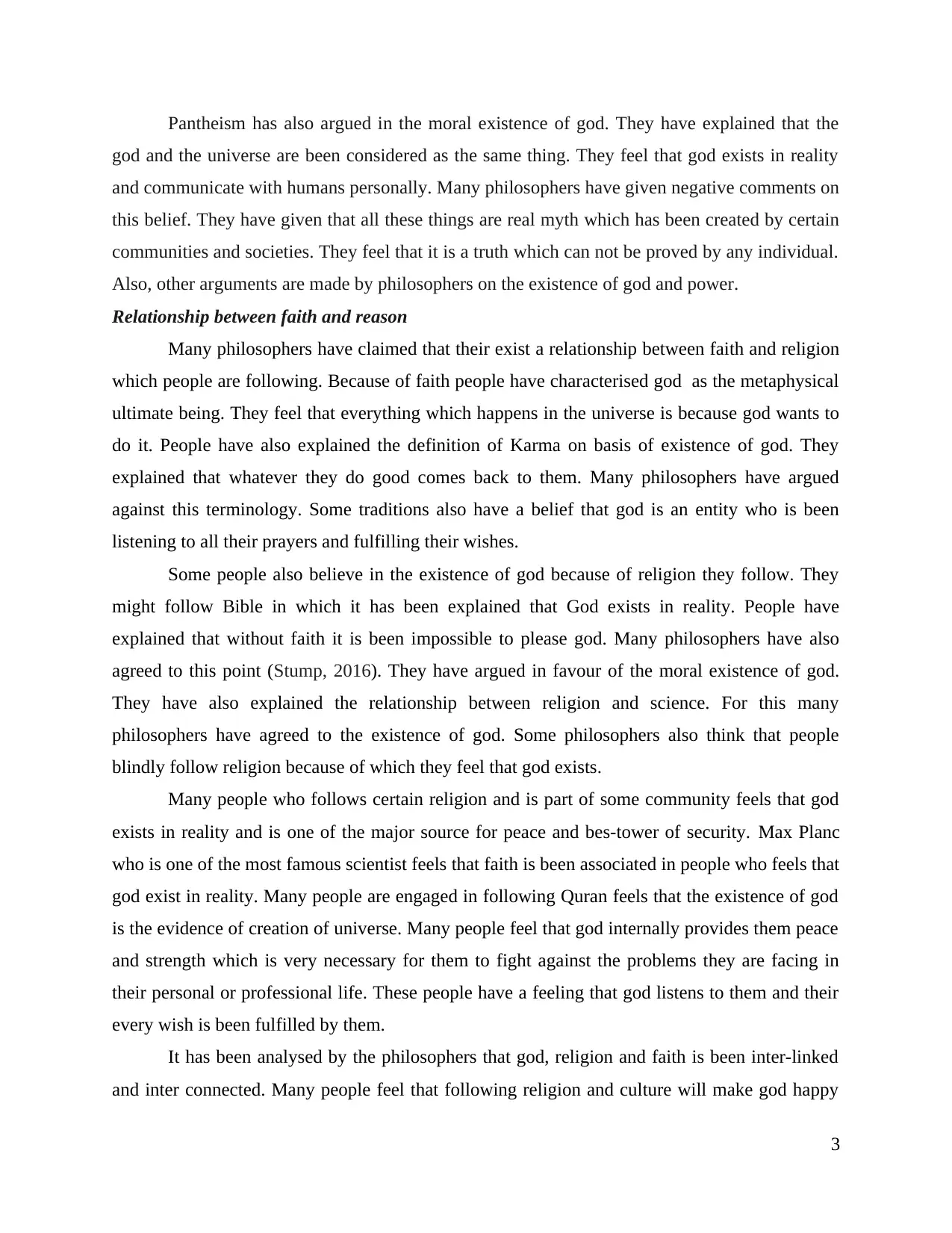
Pantheism has also argued in the moral existence of god. They have explained that the
god and the universe are been considered as the same thing. They feel that god exists in reality
and communicate with humans personally. Many philosophers have given negative comments on
this belief. They have given that all these things are real myth which has been created by certain
communities and societies. They feel that it is a truth which can not be proved by any individual.
Also, other arguments are made by philosophers on the existence of god and power.
Relationship between faith and reason
Many philosophers have claimed that their exist a relationship between faith and religion
which people are following. Because of faith people have characterised god as the metaphysical
ultimate being. They feel that everything which happens in the universe is because god wants to
do it. People have also explained the definition of Karma on basis of existence of god. They
explained that whatever they do good comes back to them. Many philosophers have argued
against this terminology. Some traditions also have a belief that god is an entity who is been
listening to all their prayers and fulfilling their wishes.
Some people also believe in the existence of god because of religion they follow. They
might follow Bible in which it has been explained that God exists in reality. People have
explained that without faith it is been impossible to please god. Many philosophers have also
agreed to this point (Stump, 2016). They have argued in favour of the moral existence of god.
They have also explained the relationship between religion and science. For this many
philosophers have agreed to the existence of god. Some philosophers also think that people
blindly follow religion because of which they feel that god exists.
Many people who follows certain religion and is part of some community feels that god
exists in reality and is one of the major source for peace and bes-tower of security. Max Planc
who is one of the most famous scientist feels that faith is been associated in people who feels that
god exist in reality. Many people are engaged in following Quran feels that the existence of god
is the evidence of creation of universe. Many people feel that god internally provides them peace
and strength which is very necessary for them to fight against the problems they are facing in
their personal or professional life. These people have a feeling that god listens to them and their
every wish is been fulfilled by them.
It has been analysed by the philosophers that god, religion and faith is been inter-linked
and inter connected. Many people feel that following religion and culture will make god happy
3
god and the universe are been considered as the same thing. They feel that god exists in reality
and communicate with humans personally. Many philosophers have given negative comments on
this belief. They have given that all these things are real myth which has been created by certain
communities and societies. They feel that it is a truth which can not be proved by any individual.
Also, other arguments are made by philosophers on the existence of god and power.
Relationship between faith and reason
Many philosophers have claimed that their exist a relationship between faith and religion
which people are following. Because of faith people have characterised god as the metaphysical
ultimate being. They feel that everything which happens in the universe is because god wants to
do it. People have also explained the definition of Karma on basis of existence of god. They
explained that whatever they do good comes back to them. Many philosophers have argued
against this terminology. Some traditions also have a belief that god is an entity who is been
listening to all their prayers and fulfilling their wishes.
Some people also believe in the existence of god because of religion they follow. They
might follow Bible in which it has been explained that God exists in reality. People have
explained that without faith it is been impossible to please god. Many philosophers have also
agreed to this point (Stump, 2016). They have argued in favour of the moral existence of god.
They have also explained the relationship between religion and science. For this many
philosophers have agreed to the existence of god. Some philosophers also think that people
blindly follow religion because of which they feel that god exists.
Many people who follows certain religion and is part of some community feels that god
exists in reality and is one of the major source for peace and bes-tower of security. Max Planc
who is one of the most famous scientist feels that faith is been associated in people who feels that
god exist in reality. Many people are engaged in following Quran feels that the existence of god
is the evidence of creation of universe. Many people feel that god internally provides them peace
and strength which is very necessary for them to fight against the problems they are facing in
their personal or professional life. These people have a feeling that god listens to them and their
every wish is been fulfilled by them.
It has been analysed by the philosophers that god, religion and faith is been inter-linked
and inter connected. Many people feel that following religion and culture will make god happy
3
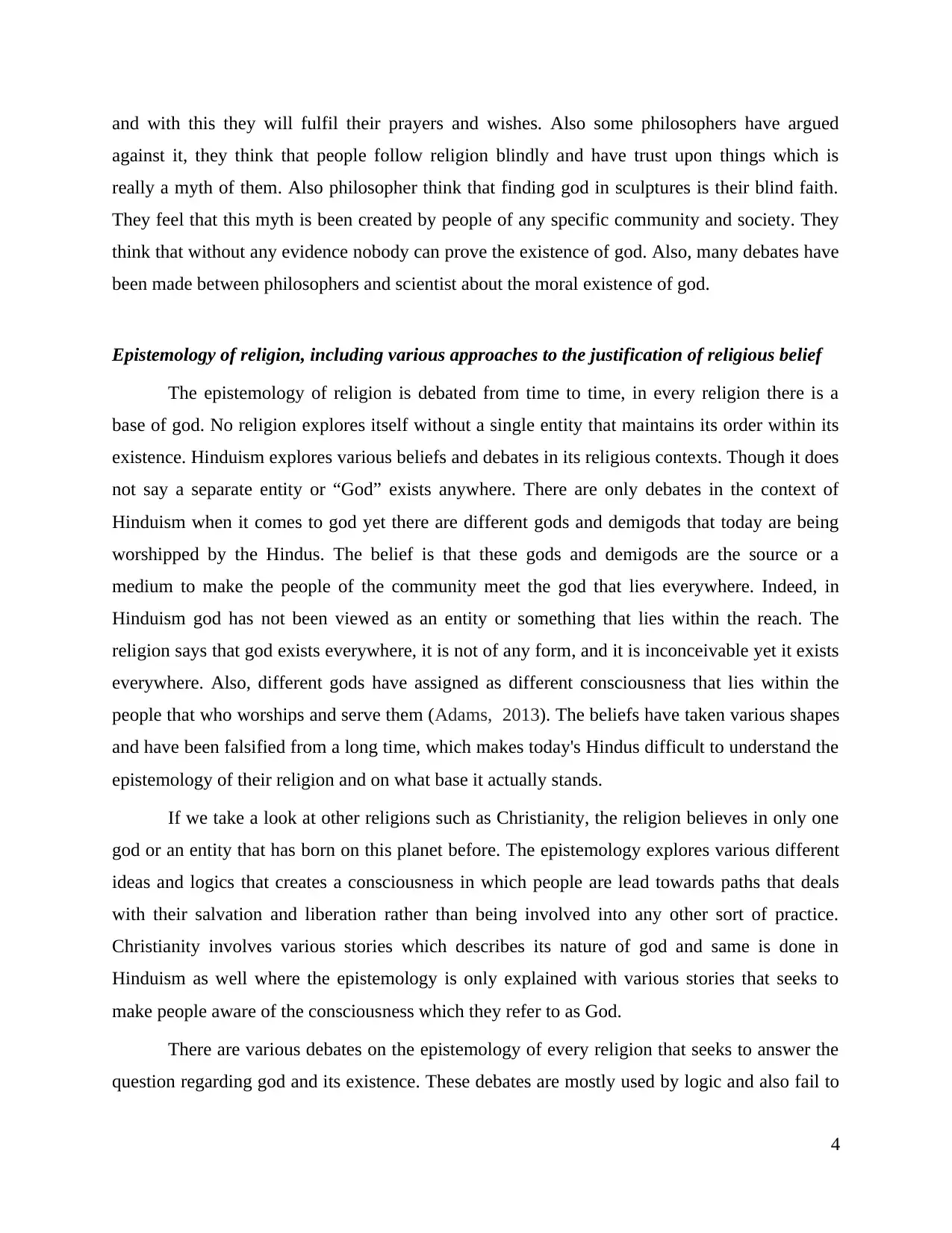
and with this they will fulfil their prayers and wishes. Also some philosophers have argued
against it, they think that people follow religion blindly and have trust upon things which is
really a myth of them. Also philosopher think that finding god in sculptures is their blind faith.
They feel that this myth is been created by people of any specific community and society. They
think that without any evidence nobody can prove the existence of god. Also, many debates have
been made between philosophers and scientist about the moral existence of god.
Epistemology of religion, including various approaches to the justification of religious belief
The epistemology of religion is debated from time to time, in every religion there is a
base of god. No religion explores itself without a single entity that maintains its order within its
existence. Hinduism explores various beliefs and debates in its religious contexts. Though it does
not say a separate entity or “God” exists anywhere. There are only debates in the context of
Hinduism when it comes to god yet there are different gods and demigods that today are being
worshipped by the Hindus. The belief is that these gods and demigods are the source or a
medium to make the people of the community meet the god that lies everywhere. Indeed, in
Hinduism god has not been viewed as an entity or something that lies within the reach. The
religion says that god exists everywhere, it is not of any form, and it is inconceivable yet it exists
everywhere. Also, different gods have assigned as different consciousness that lies within the
people that who worships and serve them (Adams, 2013). The beliefs have taken various shapes
and have been falsified from a long time, which makes today's Hindus difficult to understand the
epistemology of their religion and on what base it actually stands.
If we take a look at other religions such as Christianity, the religion believes in only one
god or an entity that has born on this planet before. The epistemology explores various different
ideas and logics that creates a consciousness in which people are lead towards paths that deals
with their salvation and liberation rather than being involved into any other sort of practice.
Christianity involves various stories which describes its nature of god and same is done in
Hinduism as well where the epistemology is only explained with various stories that seeks to
make people aware of the consciousness which they refer to as God.
There are various debates on the epistemology of every religion that seeks to answer the
question regarding god and its existence. These debates are mostly used by logic and also fail to
4
against it, they think that people follow religion blindly and have trust upon things which is
really a myth of them. Also philosopher think that finding god in sculptures is their blind faith.
They feel that this myth is been created by people of any specific community and society. They
think that without any evidence nobody can prove the existence of god. Also, many debates have
been made between philosophers and scientist about the moral existence of god.
Epistemology of religion, including various approaches to the justification of religious belief
The epistemology of religion is debated from time to time, in every religion there is a
base of god. No religion explores itself without a single entity that maintains its order within its
existence. Hinduism explores various beliefs and debates in its religious contexts. Though it does
not say a separate entity or “God” exists anywhere. There are only debates in the context of
Hinduism when it comes to god yet there are different gods and demigods that today are being
worshipped by the Hindus. The belief is that these gods and demigods are the source or a
medium to make the people of the community meet the god that lies everywhere. Indeed, in
Hinduism god has not been viewed as an entity or something that lies within the reach. The
religion says that god exists everywhere, it is not of any form, and it is inconceivable yet it exists
everywhere. Also, different gods have assigned as different consciousness that lies within the
people that who worships and serve them (Adams, 2013). The beliefs have taken various shapes
and have been falsified from a long time, which makes today's Hindus difficult to understand the
epistemology of their religion and on what base it actually stands.
If we take a look at other religions such as Christianity, the religion believes in only one
god or an entity that has born on this planet before. The epistemology explores various different
ideas and logics that creates a consciousness in which people are lead towards paths that deals
with their salvation and liberation rather than being involved into any other sort of practice.
Christianity involves various stories which describes its nature of god and same is done in
Hinduism as well where the epistemology is only explained with various stories that seeks to
make people aware of the consciousness which they refer to as God.
There are various debates on the epistemology of every religion that seeks to answer the
question regarding god and its existence. These debates are mostly used by logic and also fail to
4
⊘ This is a preview!⊘
Do you want full access?
Subscribe today to unlock all pages.

Trusted by 1+ million students worldwide
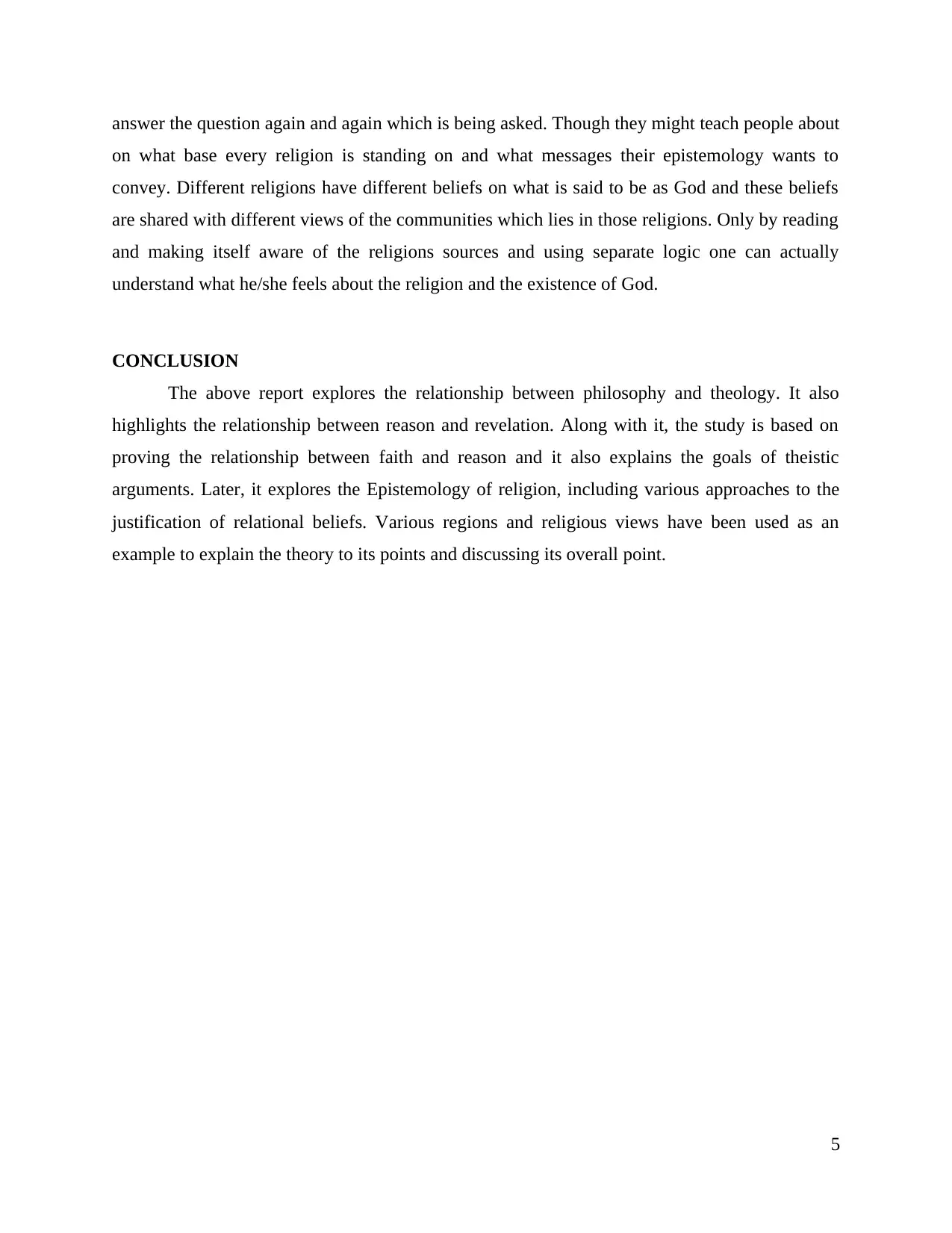
answer the question again and again which is being asked. Though they might teach people about
on what base every religion is standing on and what messages their epistemology wants to
convey. Different religions have different beliefs on what is said to be as God and these beliefs
are shared with different views of the communities which lies in those religions. Only by reading
and making itself aware of the religions sources and using separate logic one can actually
understand what he/she feels about the religion and the existence of God.
CONCLUSION
The above report explores the relationship between philosophy and theology. It also
highlights the relationship between reason and revelation. Along with it, the study is based on
proving the relationship between faith and reason and it also explains the goals of theistic
arguments. Later, it explores the Epistemology of religion, including various approaches to the
justification of relational beliefs. Various regions and religious views have been used as an
example to explain the theory to its points and discussing its overall point.
5
on what base every religion is standing on and what messages their epistemology wants to
convey. Different religions have different beliefs on what is said to be as God and these beliefs
are shared with different views of the communities which lies in those religions. Only by reading
and making itself aware of the religions sources and using separate logic one can actually
understand what he/she feels about the religion and the existence of God.
CONCLUSION
The above report explores the relationship between philosophy and theology. It also
highlights the relationship between reason and revelation. Along with it, the study is based on
proving the relationship between faith and reason and it also explains the goals of theistic
arguments. Later, it explores the Epistemology of religion, including various approaches to the
justification of relational beliefs. Various regions and religious views have been used as an
example to explain the theory to its points and discussing its overall point.
5
Paraphrase This Document
Need a fresh take? Get an instant paraphrase of this document with our AI Paraphraser
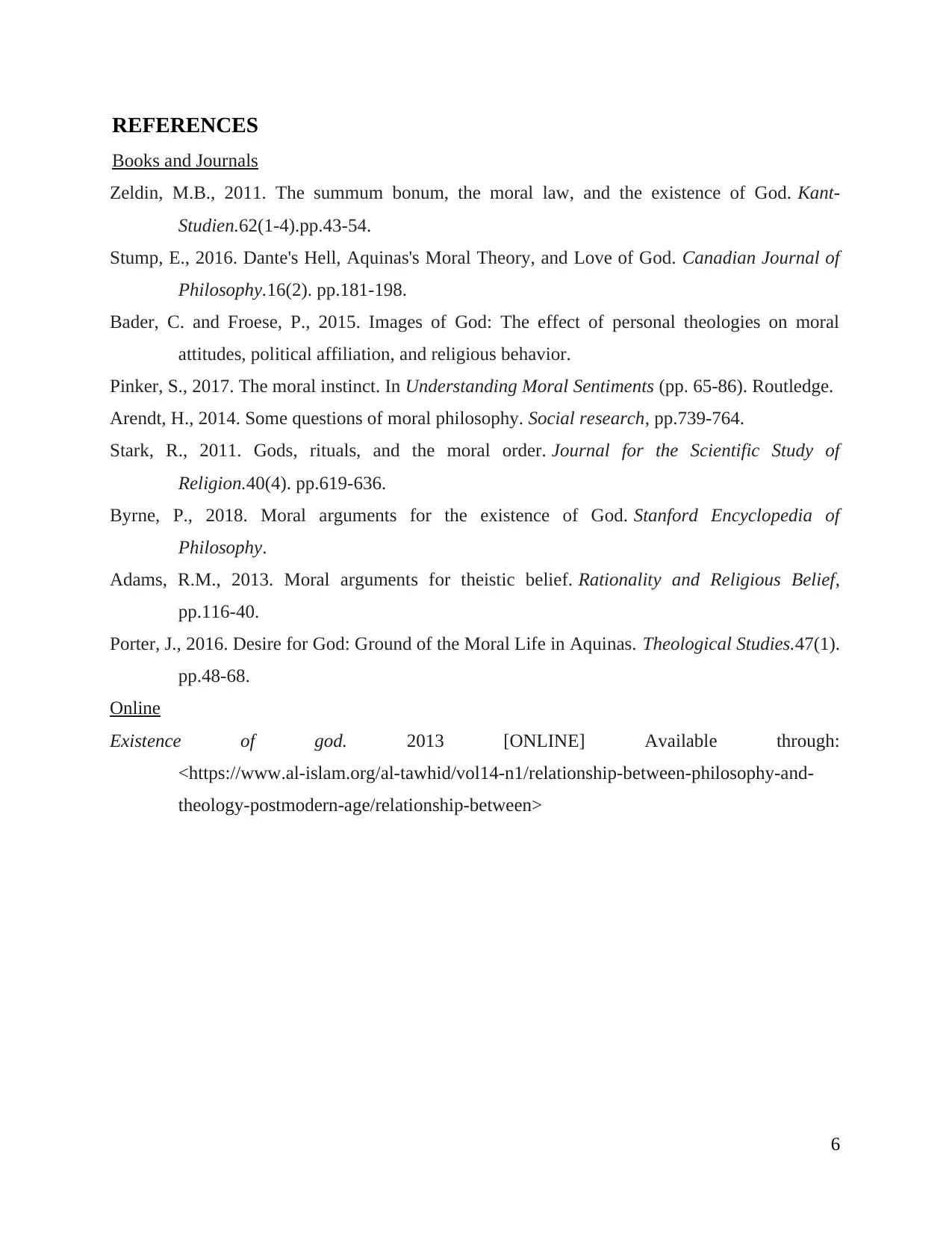
REFERENCES
Books and Journals
Zeldin, M.B., 2011. The summum bonum, the moral law, and the existence of God. Kant-
Studien.62(1-4).pp.43-54.
Stump, E., 2016. Dante's Hell, Aquinas's Moral Theory, and Love of God. Canadian Journal of
Philosophy.16(2). pp.181-198.
Bader, C. and Froese, P., 2015. Images of God: The effect of personal theologies on moral
attitudes, political affiliation, and religious behavior.
Pinker, S., 2017. The moral instinct. In Understanding Moral Sentiments (pp. 65-86). Routledge.
Arendt, H., 2014. Some questions of moral philosophy. Social research, pp.739-764.
Stark, R., 2011. Gods, rituals, and the moral order. Journal for the Scientific Study of
Religion.40(4). pp.619-636.
Byrne, P., 2018. Moral arguments for the existence of God. Stanford Encyclopedia of
Philosophy.
Adams, R.M., 2013. Moral arguments for theistic belief. Rationality and Religious Belief,
pp.116-40.
Porter, J., 2016. Desire for God: Ground of the Moral Life in Aquinas. Theological Studies.47(1).
pp.48-68.
Online
Existence of god. 2013 [ONLINE] Available through:
<https://www.al-islam.org/al-tawhid/vol14-n1/relationship-between-philosophy-and-
theology-postmodern-age/relationship-between>
6
Books and Journals
Zeldin, M.B., 2011. The summum bonum, the moral law, and the existence of God. Kant-
Studien.62(1-4).pp.43-54.
Stump, E., 2016. Dante's Hell, Aquinas's Moral Theory, and Love of God. Canadian Journal of
Philosophy.16(2). pp.181-198.
Bader, C. and Froese, P., 2015. Images of God: The effect of personal theologies on moral
attitudes, political affiliation, and religious behavior.
Pinker, S., 2017. The moral instinct. In Understanding Moral Sentiments (pp. 65-86). Routledge.
Arendt, H., 2014. Some questions of moral philosophy. Social research, pp.739-764.
Stark, R., 2011. Gods, rituals, and the moral order. Journal for the Scientific Study of
Religion.40(4). pp.619-636.
Byrne, P., 2018. Moral arguments for the existence of God. Stanford Encyclopedia of
Philosophy.
Adams, R.M., 2013. Moral arguments for theistic belief. Rationality and Religious Belief,
pp.116-40.
Porter, J., 2016. Desire for God: Ground of the Moral Life in Aquinas. Theological Studies.47(1).
pp.48-68.
Online
Existence of god. 2013 [ONLINE] Available through:
<https://www.al-islam.org/al-tawhid/vol14-n1/relationship-between-philosophy-and-
theology-postmodern-age/relationship-between>
6
1 out of 8
Related Documents
Your All-in-One AI-Powered Toolkit for Academic Success.
+13062052269
info@desklib.com
Available 24*7 on WhatsApp / Email
![[object Object]](/_next/static/media/star-bottom.7253800d.svg)
Unlock your academic potential
Copyright © 2020–2026 A2Z Services. All Rights Reserved. Developed and managed by ZUCOL.





